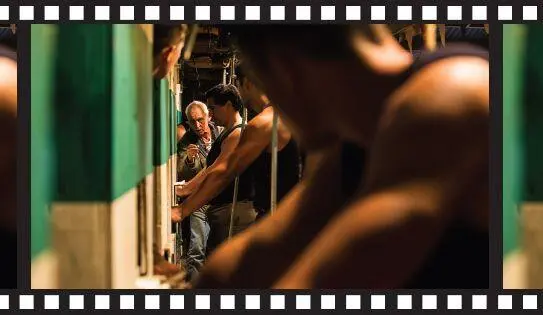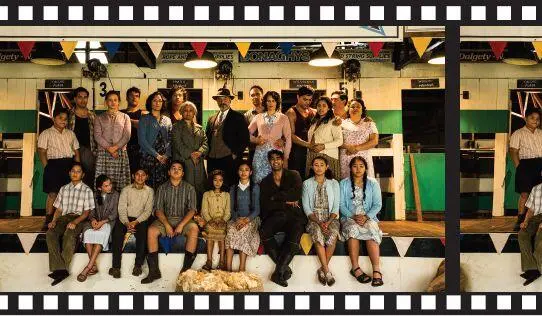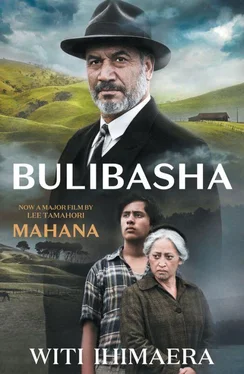
Director Lee Tamahori oversees the shearing scene.

The Mahana cast.
This novel is dedicated to my father, Te Haa Ihimaera Smiler Jnr, my grandfather Pera Punahamoa Ihimaera Smiler and the great Smiler family of whom I am a member. It is also written in memory of my fabulous grandaunt, Mini Tupara, Uncle George Tupara and the Tupara family.
Bulibasha is a work of fiction. Although Waituhi is a real village, Hukareka is not. For geographical purposes Hukareka has been situated somewhere between Manutuke and Bartletts. The Golden Fleece championships is modelled on the Golden Shears competition.
The novel was written when I was the Katherine Mansfield Fellow, Menton, France. My thanks are due to the Katherine Mansfield Trust, the Electricity Corporation of New Zealand, Mrs Marguerite Lilley, and Professor Albert Wendt and the University of Auckland for leave from the English Department.
From the bottom of my heart I thank William Rubinstein, trustee for the Katherine Mansfield Fellowship in France and secretary of the New Zealand France Association, Nice, and his wife Nelly. Thanks also to the New Zealand France Association, Monsieur Frederic Billy and the Maire of Menton, my French teacher Monsieur Alain Roman, Jean and Olga Franc de Ferriere, Jacqueline Bardolph and Jean, William Waterfield and Angelique, Annabelle White, Gordon Stewart, Maarire, Terry, David and Guillaume for their support — and to Jane, and Jessica Kiri and Olivia Ata, the best daughters in the world.
There was no better place to write Bulibasha than in the south of France, close to Italy, where verismo — temperament, passion, pain and laughter — is so much akin to the Waituhi Valley’s own passionate involvement in life, death and history. I pay tribute to the sun, mountains and peoples bordering the great Mediterranean Sea.
Witi Ihimaera’s first book for Penguin Random House was Pounamu, Pounamu (1972) and he has subsequently written 13 novels, including The Whale Rider (1987), seven collections of short stories including The Thrill of Falling (2012), and works for children. His most recent book for Penguin Random House is Maori Boy (2014), the first volume of his memoir.
A multi-award-winning writer, Ihimaera has had careers in diplomacy, teaching, opera, theatre, film and television. He has recently taught in the Native Arts Program, Banff Centre, Canada, was Patron of the Rochefort Oceanic Film Festival, France, 2014, and gave the New Zealand Book Council lecture, ‘Where is New Zealand Literature Heading?’ at the Dunedin Writers and Readers Festival, 2015. He was a Randell Cottage Fellow in 2015 and his play All Our Sons was premiered that same year, winning six Wellington Theatre Awards including Best Play and Best Original Production.
He lives in Auckland.
Act One: Opening Shot: Early 1990s, France
In 1993 I travelled to Menton, France, as the Katherine Mansfield Fellow. I planned to stay for six months and to write the long-delayed sequel to my novel The Matriarch , published seven years earlier in 1986. As soon as I had unpacked my bags and started writing, I knew I was in trouble.
The sequel was The Dream Swimmer . There I was, in a country on the other side of the world, totally separated from the mythic, historical and geographical library resources I needed to assist me to create the metafictional, post-modern, post-colonial hydra of the story. In those days when internet research was in its infancy, I had none of the books and manuscripts that would help me build the historical and cultural bones to enable the sequel to, well, swim.
I didn’t have Dad with me, either, my wonderful storyteller father upon whose oral stories I relied. Long-distance phone calls with him only took me so far, and ominous intervals in the writing process started to open up like chasms.
In Katherine Mansfield’s Villa Isola Bella, where I was writing, my poor dream swimmer began foundering in her sea of dreams. What had I been thinking?!
I went around Menton or down to the sunny plage , muttering foul imprecations against any poor unsuspecting French boulevardiers if they got in my way. I was still very cross when, three weeks after my arrival, my friends William and Nelly Rubinstein drove me to the government immigration offices in Nice where I could apply for my carte de séjour , the identity card all visitors need to stay in France. On our way back to Menton, we came across a strange and motley group of cars and caravans parked by the side of the road. People were standing or sitting around the vehicles, and the women were cooking on open fires. Children were laughing and playing on the verge and, as our car passed, some of them came running to the window to ask us for coins.
‘Who are they?’ I asked.
‘Oh, they are gypsies,’ William answered. ‘They come to the French Riviera every year to sell their wares, tell fortunes and …’ he paused and, knowing my penchant for drama, added, ‘… steal babies … and maybe torture grumpy Maoris like you.’
Instantly the clouds dispersed and I knew my troubles were over.
My memory went back to the times when I had been a young boy in the 1950s. My family was part of an extended Maori clan that depended on shearing sheep for our livelihood. The head of our family was my formidable grandfather Pera Punahamoa, and he ran three shearing gangs, and my Dad was the padrone of one of them.
One night, as we were driving from one shearing contract to the next, we picked up a gypsy boy from Romania. He came to work with us and stayed for the season.
What had he called Grandad?
Bulibasha, the Romany title for the King of the Gypsies.
Act Two: Flashback: 1950s, New Zealand
I wrote Bulibasha, King of the Gypsies in six months in France. As soon as I started, the story or, rather, stories of the ‘gypsy’ Smiler family, our shearing history, sporting and cultural kapa haka group came up and out of me without hitting the sides.
More to the point, they did, the colourful members of my huge, rambunctious, larger-than-life clan. Among them was my grandad, Pera Punahamoa, like an Italian Godfather, and my grandmother, Teria, his beautiful and refined donna . And of course my carelessly muscled father, Tom, and my mother, Julia.
While I was relieved that I would be able to show something from my Menton sojourn, the situation as a writer is this: once you start writing a book, the characters sneak up on you, look over your shoulder, jostling you as you are doing some shopping in the market or, ‘Kia ora, nephew,’ putting a towel and flax kete beside you as you sun yourself on the nude beach.
They never leave you ay- lone .
I had no option but to live again with the family who had once taken over my life and were now crowding my personal space. Like my hockey-playing aunties or dashing haka-boogie uncles, they began bossing me around and taking over my ambition to be, well, a literary writer of fine quality fiction. Even so, I hoped that I might maintain some standards, and so I tried to emulate if not Mansfield at least Marcel Pagnol, whose books Fanny, Jean de Florette, Manon des Sources and especially La Gloire de mon père and Le Château de ma mère were among a number of family-oriented sagas that inspired my attempts at writing a Maori family into existence in New Zealand fiction. Being a Maori Marcel Pagnol had a comforting ring to it.
Читать дальше














